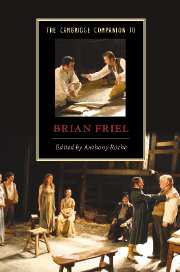Book contents
- Frontmatter
- 1 Introduction
- 2 The early plays
- 3 Surviving the 1960s: three plays by Brian Friel 1968-1971
- 4 Friel and the Northern Ireland “Troubles” play
- 5 Family affairs: Friel’s plays of the late 1970s
- 6 Five ways of looking at Faith Healer
- 7 Translations, the Field Day debate and the re-imagining of Irish identity
- 8 Dancing at Lughnasaand the unfinished revolution
- 9 The late plays
- 10 Friel’s Irish Russia
- 11 Friel and performance history
- 12 Friel’s dramaturgy: the visual dimension
- 13 Performativity, unruly bodies and gender in Brian Friel’s drama
- 14 Brian Friel as postcolonial playwright
- Bibliography
- Index
3 - Surviving the 1960s: three plays by Brian Friel 1968-1971
Published online by Cambridge University Press: 28 January 2007
- Frontmatter
- 1 Introduction
- 2 The early plays
- 3 Surviving the 1960s: three plays by Brian Friel 1968-1971
- 4 Friel and the Northern Ireland “Troubles” play
- 5 Family affairs: Friel’s plays of the late 1970s
- 6 Five ways of looking at Faith Healer
- 7 Translations, the Field Day debate and the re-imagining of Irish identity
- 8 Dancing at Lughnasaand the unfinished revolution
- 9 The late plays
- 10 Friel’s Irish Russia
- 11 Friel and performance history
- 12 Friel’s dramaturgy: the visual dimension
- 13 Performativity, unruly bodies and gender in Brian Friel’s drama
- 14 Brian Friel as postcolonial playwright
- Bibliography
- Index
Summary
Irish playwrights have a dread of one quality, one that should not be mentioned in front of them: stamina. We seem to lack it in our dramatic genetic code. George Farquhar dies impoverished, leaving two important plays, The Recruiting Officer (1706) and The Beaux' Stratagem (1707), in his slim volume of works. Clever Sheridan knows he will never better The Rivals (1775) and The School for Scandal (1777) and turns instead to politics, effectively silencing his writerly voice as he did the singing of his wife, Elizabeth - a sad case of cutting off two noses to spite one face. Wilde let himself be martyred by the sexual violence of heterosexual bigotry. Synge died too young, having achieved an extraordinary output. Shaw is the exception that proves the rule. But who would now take that confused master as model? By the 1960s, when Brian Friel, Tom Murphy, Hugh Leonard and Thomas Kilroy were establishing themselves as the dominant presences in the future of Irish playwriting, it was already clear that O'Casey's powerful legacy would reside in the Dublin trilogy of the 1920s. The great novels and plays behind him, Beckett was sliding into the reductive banality of Breath (1969). So, the great question posed to the four young dramatists was: How do I go on? In the case of Brian Friel, it was to take stock of his career so far and concentrate on writing exclusively, deliberately, for the Irish stage through the years 1968 to 1971.
- Type
- Chapter
- Information
- The Cambridge Companion to Brian Friel , pp. 18 - 29Publisher: Cambridge University PressPrint publication year: 2006
- 1
- Cited by

